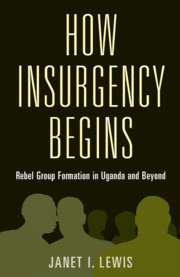Book contents
- How Insurgency Begins
- Cambridge Studies in Comparative Politics
- How Insurgency Begins
- Copyright page
- Contents
- Figures
- Tables
- Acknowledgments
- Part I Rethinking How Armed Conflicts Begin
- Part II Uganda and Beyond
- Part III Implications
- 7 Implications for Scholarship and Policy
- Book part
- References
- Index
- Series page
7 - Implications for Scholarship and Policy
from Part III - Implications
Published online by Cambridge University Press: 18 September 2020
- How Insurgency Begins
- Cambridge Studies in Comparative Politics
- How Insurgency Begins
- Copyright page
- Contents
- Figures
- Tables
- Acknowledgments
- Part I Rethinking How Armed Conflicts Begin
- Part II Uganda and Beyond
- Part III Implications
- 7 Implications for Scholarship and Policy
- Book part
- References
- Index
- Series page
Summary
This chapter concludes by discussing the scholarly and policy implications of the book’s findings. First, it discusses implications for data on conflict onset, arguing that the book has shown that omissions in existing data prevent current work from learning about the start of conflict, and suggests avenues for generating better data. Then, it argues that these omissions have created major inferential issues in prior work about the role of ethnicity in conflict onset. It uses evidence from Uganda presented in prior chapters to show how this problem plagues data used in prominent study that found a strong relationship between ethnic exclusion and rebellion onset. Third, it argues that this book has shown the importance of civil intelligence institutions to state building and notes the thorny ethical issues associated with this finding. Finally, the chapter considers how the early stages of rebel group formation would differ in stronger state contexts, arguing that in such contexts barriers to new rebel entry are higher and thus we should expect rebellion to be more rare and more explosive.
Keywords
- Type
- Chapter
- Information
- How Insurgency BeginsRebel Group Formation in Uganda and Beyond, pp. 205 - 217Publisher: Cambridge University PressPrint publication year: 2020

